|
|
|
Sort Order |
|
|
|
Items / Page
|
|
|
|
|
|
|
| Srl | Item |
| 1 |
ID:
188882
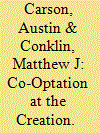

|
|
|
|
|
| Summary/Abstract |
This article analyzes how democratic leaders cultivate an elite consensus in favor of participating in international institutions. We theorize two tactics to prevent elite dissent. Delegating early policy development to technocratic and nonpartisan experts can set a depoliticized tone. Later integration of opposition elites into the process can create powerful advocates that expand support to a consensus. We assess contrasting fates of the United Nations (UN) and International Trade Organization (ITO). Haunted by Woodrow Wilson’s failure to win approval for the League of Nations, leaders outsourced early planning for a UN to the Council on Foreign Relations. Later, Franklin D. Roosevelt and top aides tapped moderate Republicans for the US delegation to San Francisco, creating powerful Republican advocates. In contrast, leaders developed the ITO in-house and excluded legislative elites in final negotiations, provoking elite dissent. These tactics shed new light on leaders, elites, and the domestic politics of international order and hegemony.
|
|
|
|
|
|
|
|
|
|
|
|
|
|
|
|
| 2 |
ID:
153939
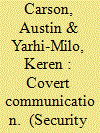

|
|
|
|
|
| Summary/Abstract |
Can states credibly communicate their intentions through covert policy tools, despite the absence of credibility-enhancing publicity? Most extant research suggests covert action and secrecy in general are uniquely uninformative and often used as an alternative to signaling. Yet episodes such as Richard Nixon's secret bombing of Cambodia suggest that leaders have used covert action to convey intentions and coerce adversaries. This article builds a theoretical framework for understanding signaling in the covert sphere, developing reasons why states find covert communication both intelligible (that is, the basic intended message is understandable) and credible (that is, the message is believable). We argue that two target audiences—local allies and strategic adversaries—tend to observe covert action and that the costs and risks incurred by initiating and expanding covert action credibly convey resolve. We assess our arguments empirically through careful process tracing of a set of nested covert interventions by Soviet and American leaders in conflicts in Angola and Afghanistan. Drawing on a trove of recently declassified material, we assess intentions and inferences related to covert signaling. We find that both strategic adversaries and local partners observed and drew inferences about resolve. Covert lethal aid programs thereby served as a credible indicator of resolve through three mechanisms we identify in the paper: sunk costs, counter-escalation risks, and domestic political risks. These findings have important implications for the study of coercive bargaining, secrecy, and reputation. They also shed light on an important policy tool contemporary policymakers will likely use, suggesting the kinds of effects covert action has and elucidating the basic interpretive framework needed to communicate messages with new methods like covert cyber attacks.
|
|
|
|
|
|
|
|
|
|
|
|
|
|
|
|
| 3 |
ID:
145011
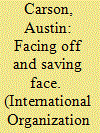

|
|
|
|
|
| Summary/Abstract |
States pursue their cooperative and competitive goals using both public and private policy tools. Yet there is a profound mismatch between the depth, variety, and importance of covert activity and what scholars of International Relations (IR) know about it. This article addresses this gap by analyzing how adversaries struggle for influence within the covert sphere, why they often retreat to it, and when they abandon it. It focuses on secrecy among adversaries intervening in local conflicts and develops a theory about secrecy's utility as a device for creating sustainable limits in war. Drawing on insights about secrecy and face-work from the sociologist Erving Goffman, I show that major powers individually and collectively conceal evidence of foreign involvement when the danger of unintended conflict escalation is acute. Doing so creates a kind of “backstage” in which adversaries can exceed limits on war without stimulating hard-to-resist pressure to escalate further. An important payoff of the theory is making sense of puzzling cases of forbearance: even though adversaries often know about their opponent's covert activity, they often abstain from publicizing it. Such “tacit collusion” arises when both sides seek to manage escalation risks even as they compete for power and refuse to capitulate. The article evaluates the theory via several nested cases of external intervention in the Korean War. Drawing on newly available materials documenting the covert air war between secretly deployed Soviet pilots and Western forces, the cases show how adversaries can successfully limit war by concealing activity from outside audiences. Beyond highlighting the promise in studying the covert realm in world politics, the article has important implications for scholarship on coercive bargaining, reputation, state uses of secrecy, and how regime type influences conflict behavior.
|
|
|
|
|
|
|
|
|
|
|
|
|
|
|
|
| 4 |
ID:
104045
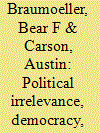

|
|
|
|
|
| Publication |
2011.
|
| Summary/Abstract |
Although the statistical literature on conflict studies has generated strong and consistent findings on the relationship of political irrelevance and dyadic democracy to conflict, scholars have paid scant attention to the interesting theoretical issue of how they matter. The authors argue that additive controls and dropping irrelevant dyads constitute misspecifications of their effects. There are theoretical reasons to believe that the impact of distance on conflict is not sufficiently severe to justify the practice of simply dropping irrelevant dyads. Moreover, they argue that political irrelevance and dyadic democracy, rather than subtracting some constant quantity, interact to impose an upper bound on the probability of conflict initiation. They find both of these arguments to be supported in a reanalysis of a prominent study of dispute initiation.
|
|
|
|
|
|
|
|
|
|
|
|
|
|
|
|
| 5 |
ID:
178967
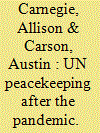

|
|
|
|
|
| Summary/Abstract |
Increasing peacekeepers’ access to information derived from intelligence sources could help compensate for their reduced physical presence due to COVID-19.
|
|
|
|
|
|
|
|
|
|
|
|
|
|
|
|
|
|
|
|
|